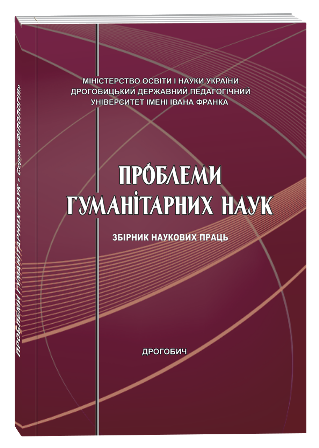SELECTED ASPECTS OF IMPLEMENTING PREPOSITIONAL VERB GOVERNMENT IN THE POLISH AND UKRAINIAN LANGUAGES
DOI:
https://doi.org/10.24919/2522-4565.2023.58.3Keywords:
syntax, verb government, prepositional constructions, Polish language, Ukrainian languageAbstract
The article analyses the peculiarities of prepositional verb government in Polish and Ukrainian from a comparative perspective. Comparative linguistics allows us to indentify similarities and differences in the linguistic and communicative structures of both languages and their usage, and also helps to establish successful interlingual communication. The lexical and grammatical norm of a language determines the prepositional or non-prepositional way of combining a verb with a dependent word and its wordform. The publication focuses on the semantic and grammatical structures of genealogically related languages (Polish and Ukrainian). To achieve the goal and implement the set tasks we have used the descriptive and comparative methods of linguistic research. In both languages, there are certain common features of the syntactic link of government, which do not cause any difficulties for Ukrainians in the use of Polish normative structures (e.g. zasłużyć na coś – заслуговувати на щось), because of their indentity. Despite a number of similarities, the analysed material demonstrates that there are significant differences in prepositional verb constructions. The purpuse of the present study is to analyse the distinctive ways of implementing the syntactic control relations in prepositional constructions in Polish and Ukrainian on the example of selected verb phrases. Attention is paid to functionally identical prepositional-verb phrases in Polish and Ukrainian: a similar preposition is combined with a dependent word in different cases (e.g. zakochać się w kimś / czymś – закохатися в когось / щось); another preposition is used, which causes a change in the case of the dependent word (e.g. ożenić się z kimś – женитися на комусь (рідко з ким) or does not cause a change in the case of the dependent noun or pronoun (e.g. głosować na kogoś / coś – голосувати за когось / щось). Awareness of the specifics of Polish prepositional verb constructions will help to avoid syntactic calques from Ukrainian and the errors caused by interference in the Polish speech of Ukrainians.
References
Зелінська М. З. Комунікативна компетенція молодих носіїв польської мови західних областей України : Монографія. Дрогобич : По́світ, 2018. 288 с.
Колібаба Л. Актуалізовані прийменники в українській літературній мові початку ХХІ сторіччя. Українська мова. 2015. № 4. С. 78–88.
Кононенко І. Українська та польська мови : контрастивне дослідження, Варшава, 2012. 808 с.
Межов О. Вплив дієслівних постфіксів-прийменників на вибір об’єктних відмінків у сучасній українській мові. Граматичний простір сучасної лінгвоукраїністики. Катерині Григорівні Городенській : зб. наук. пр. / Ін-т укр. мови НАН України. Київ, 2019. С. 129–138.
Огорілко О. В. Синтаксичні особливості текстів сучасної польськомовної преси в Україні : автореф. дис. … канд. філ. наук : спеціальність 10.02.03. Київ, 2014. 20 с.
Сучасна українська літературна мова. Синтаксис : [кол. монографія] / Ін-т мовознавства ім. О. О. Потебні АН УРСР; за заг. ред. І. К. Білодіда. Київ : Наукова думка, 1972. 516 с.
Jabłońska M. Konstrukcje przyimkowe jako jeden z przejawów analityzacji polszczyzny. PoradnikJęzykowy. 2016. №8. S. 75–89.
Język polski. Poradnik Profesora Andrzeja Markowskiego. Warszawa : WILGA Sp. z o. o., 2003. 496 s.
Krawczuk A. Leksykologia i kultura języka polskiego. Podręcznik dla szkół wyższych. Т. 2. Kultura języka. Kijów : Firma «INKOS», 2017. 328 s.
Krawczuk A. Związki rządu we współczesnej odziedziczonej polszczyźnie pisanej na Ukrainie na tle języka ogólnopolskiego. Z bliska i z daleka. Język polski w badaniach językoznawców lwowskich i toruńskich / Pod red. M. Gębki-Wolak i A. Krawczuk. Toruń : Wydawnictwo Naukowe Uniwersytetu Mikołaja Kopernika, 2019. S. 79–102.
Krawczuk A., Kowalewski J. Metodyka nauczania języka polskiego. Język i kultura w dydaktyce polonistycznej na Ukrainie. Kijów : Firma «INKOS», 2017. 324 s.
Wielki słownik poprawnej polszczyzny / Pod red. A. Markowskiego. Warszawa : PWN, 2008. 1708 s.



